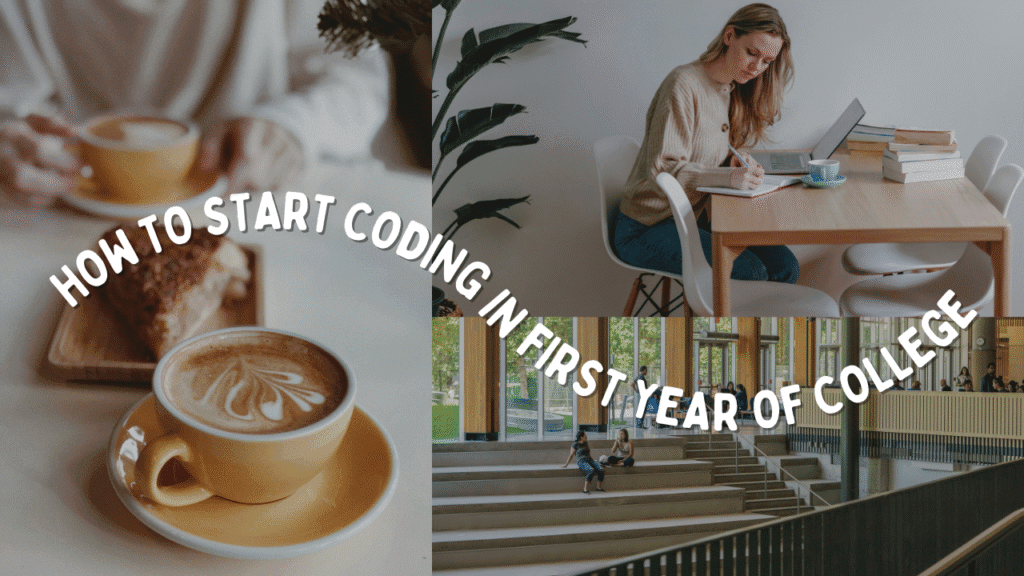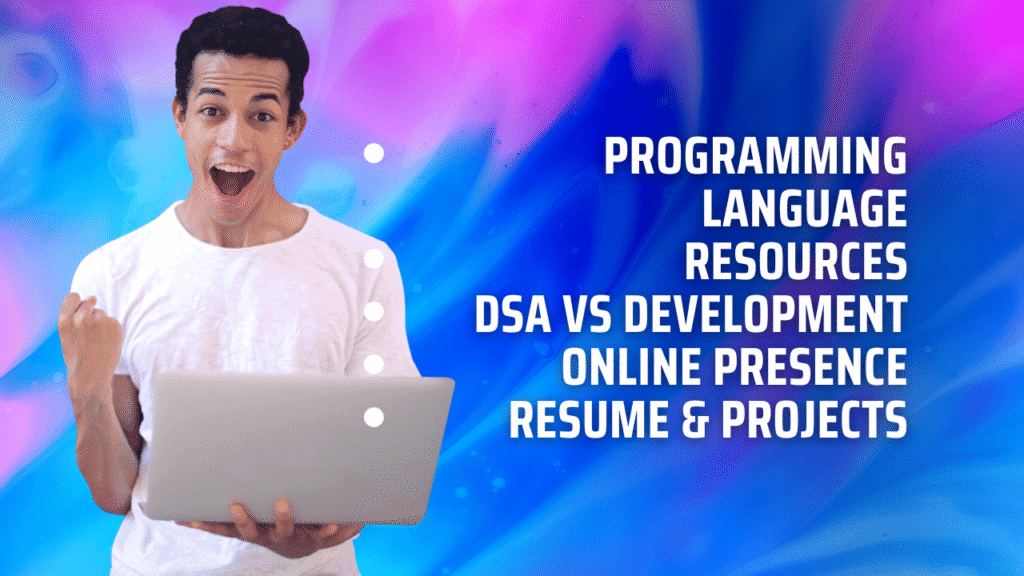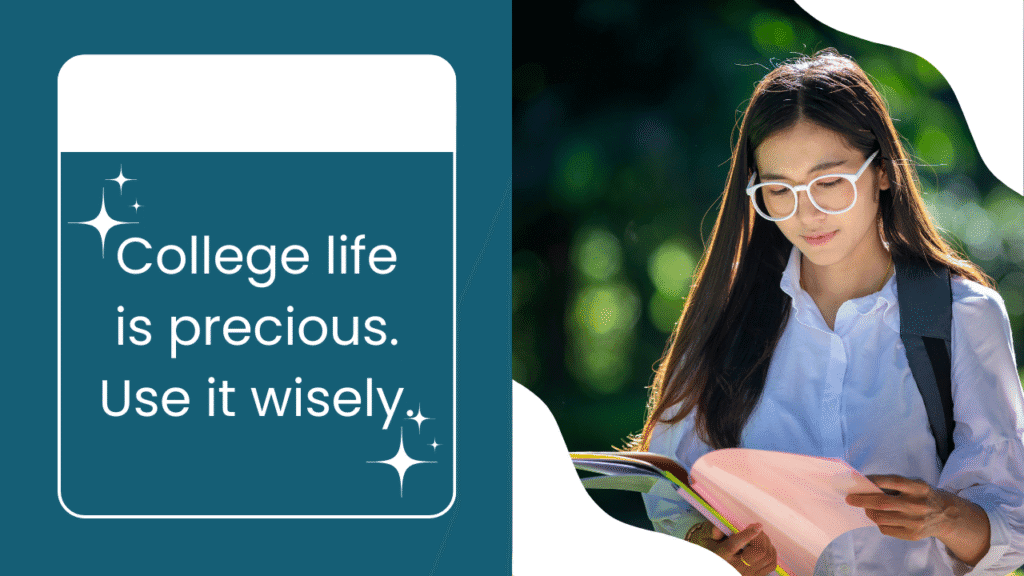Many of you have just joined college in your first year. You’re beginning to make friends, transitioning from intermediate, and slowly exploring what college life is all about. One of the biggest questions that arises at this stage is: how do we start coding in first year?
In this blog, let’s see the 9 key steps on how to start coding in the first year.

Step 1: Pick One Programming Language
It can be Python, Java, C, or C++; there are several. You need to select one.
- In most colleges, in the first year, they usually teach one language by default.
- For example, in many colleges, they teach the C language to everyone.
- Whatever language your college teaches, continue with it.
Example
In most colleges, they teach the C language to all students in the first year.
Step 2: Follow Professors and Notes
When professors are teaching, take notes and clarify any doubts you may have. This will help a lot. Stick with whatever language they start with.
But if you want to start with Python, yes, you can. Python is much easier compared to C or Java. It’s simple to learn.
Comparison of Programming Languages for Beginners
| Language | Difficulty Level | Why Learn It in 1st Year? | Career Use Cases |
|---|---|---|---|
| Python | Easy | Beginner-friendly syntax, easy to learn | Data Science, AI, Web Development |
| C | Moderate | Builds strong fundamentals in memory & logic | System Programming, Embedded Systems |
| C++ | Moderate–Hard | Teaches OOP concepts (Object-Oriented Programming) and problem-solving | Competitive Programming, Game Development |
| Java | Harder | Industry-level coding, widely used in companies | Enterprise Apps, Android Development |
Step 3: Focus Areas in Learning
When learning your first coding language, focus mainly on two things:
- Problem-solving
- Syntax
Every coding language has its own syntax. You need to understand how that works and how coding works in general.
Across every coding topic and language, you’ll find:
- Variables
- Loops
- If-else conditionals
- Functions
These are common in all coding languages. You have to understand how it works and the logic behind them, and when to apply them. Using these, you solve problems. That’s the main skill.
Once you learn problem-solving and logic, even if you switch languages, the core concepts remain the same, only the syntax changes.
Step 4: Resources to Start Coding in First Year
There are several good resources available:
- Websites: W3Schools, JavaTpoint, GeeksforGeeks
- Practice platforms: HackerRank (solve problems topic by topic)
- YouTube channels:
- “Code with Harry” (Hindi)
- “FreeCodeCamp” (English)
Free Coding Resources to Learn Coding
| Platform | Best For | Link |
|---|---|---|
| GeeksforGeeks | Practice problems, theory | geeksforgeeks.org |
| FreeCodeCamp | Hands-on projects | freecodecamp.org |
| HackerRank | Competitive coding | hackerrank.com |
| YouTube Channels | Quick tutorials | Neso Academy, CodeWithHarry |

Step 5: Development vs. DSA
Many students have a common doubt: Should I learn development or DSA?
If you’re in Tier 1 Colleges (IITs, NITs)
- Start with DSA.
- Reason: Top companies visit these colleges for internships and placements, and they ask a lot of DSA questions.
If you’re in Tier 2 or Tier 3 Colleges
- Start with development first before DSA.
- Reason: Early-stage startups or good startups usually hire for developer roles.
Development paths can include:
- Web development
- Android app development
- Machine learning
- Data science
Step 6: Build Online Presence
When you’re learning coding, doing projects, and exploring development, you also need to build your online presence.
- LinkedIn → Post about what you’re learning. Recruiters searching for interns may find your profile.
- Twitter → Share small updates like, “Today I learned this.”
Tip: Posting projects and progress online increases your chances of being noticed by recruiters.
Step 7: Create a Strong Resume
For a good resume, focus on:
- Solid projects → Small projects won’t stand out because of AI tools like ChatGPT and Bard.
- Creativity → Add real-world solutions to projects.
- Standout factor → Recruiters and interviewers notice unique projects more.
Step 8: Five Checkpoints Every First-Year Student Must Follow
1. Daily Practice
- Practice any coding language for 45 to 60 minutes daily.
- Take some 10 min rest for every 1 hour of coding requires mental energy and can be exhausting.
- Errors will frustrate you, so keep your practice time limited.
2. Handwritten Notes
- Whenever you learn a new topic, maintain handwritten notes.
- Example: If you learned variables today, write handwritten notes about them.
- After 5–6 months, your revision will be much easier.
3. Practice Aptitude
- Focus on mathematics, logical reasoning, and quantitative aptitude, and practice regularly.
- Not a lot, just enough to be familiar with placement season.
Daily Coding Routine Table
| Time | Activity | Purpose |
|---|---|---|
| 1 hr | Learn a new concept (loops, functions, etc.) | Build foundation |
| 30 min | Solve 2–3 coding problems | Apply knowledge |
| 15 min | Revise what you learned | Retain concepts |
| 15 min | Take a break (walk, stretch) | Refresh mind |
4. Maintain CGPA
- Many people say CGPA doesn’t matter in B.Tech., but it is actually very important.
- 7.5+ CGPA is much better for placements.
- For higher studies abroad: 8.5–9 CGPA is recommended.
5. Join Clubs & Activities
- Join various clubs to make connections with seniors and students from other branches.
- Clubs provide exposure, teamwork, and networking opportunities.

Step 9: Mistakes to Avoid
- Don’t start DSA and development at the same time. Pick one and follow a flow:
- First, learn a programming language
- Then either DSA or development
- Then work on projects
- Alongside → keep practicing aptitude
- Don’t compare with others.
- Everyone’s journey is different.
- Respect your own pace.
- Utilize free time wisely.
- College gives you free periods and long breaks like summer holidays.
- Use them for trips, enjoyment, internships, and building projects.
- Avoid wasting time only on Instagram reels or fan wars on Twitter.
Quote: “College life is precious. This is the most important phase of your life. Use it carefully.”
Conclusion
Starting coding in your first year is not about rushing or comparing. Pick one language, learn problem-solving and syntax, explore either development or DSA, build projects, maintain your CGPA, and participate in clubs. Alongside coding, focus on projects, create an online presence, practice aptitude, maintain a good CGPA, and actively participate in clubs.
Avoid rushing into everything at once, and don’t compare with others. Utilize your free time wisely because college life is one of the most important phases of your life. For more tips, guides, and updates, visit BuzzIndie.